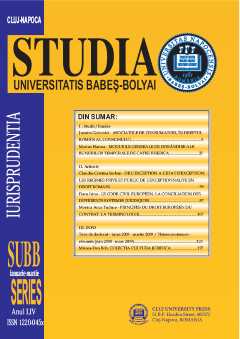CLAUZE ABUZIVE VERSUS CLAUZE LEZIONARE ÎN CONTRACTELE CONSUMATORILOR
UNFAIR TERMS VERSUS UNREASONABLE DISADVANTAGE IN CONTRACTS CONCLUDED BY CONSUMERS
Author(s): Juanita GoicoviciSubject(s): Law, Constitution, Jurisprudence
Published by: Studia Universitatis Babes-Bolyai
Keywords: Unfair terms; imbalance; contracts; consumer; judicial unfairness.
Summary/Abstract: Unfair terms versus unreasonable disadvantage in contracts concluded by consumers. Contractual fairness implies that, as a matter of logic, parties as subjected to good faith and contractual equilibrium from the start of negotiations through the performance of the contract, or even beyond. In Consumer Law, standard terms only bind the parties if being accepted by the consumer who has had the chance to properly consult them. This contribution looks into the goal of the national regulation on unfair terms against consumers, in a context in which an unreasonable disadvantage for the consumer may also arise from the provision not being clear and comprehensible. It is argued that the unfair terms regulation is not superposed by the regulation of unreasonable disadvantage in the Romanian New Civil Code, because of the mere fact that numerous contractual provisions against consumers are not subject of patrimonial disequilibrium. It is the case of arbitration clauses, competency clauses, confidentiality clauses etc., which do not raise the problem of excessive patrimonial benefit to the detriment of the consumer; instead, these contractual provisions raise the question of judicial disadvantages or significant imbalance between the rights and obligations of the parties in terms of procedural prerogatives.
Journal: Studia Universitatis Babes Bolyai - Iurisprudentia
- Issue Year: 59/2014
- Issue No: 4
- Page Range: 83-98
- Page Count: 16
- Language: Romanian

